As September begins, we are sharing the thoughts of Friends who spent Annual Sessions with us last July. They were glad to be present for interesting workshops, important meetings for business, and plenary presentations by talented speakers like Dr. Amanda Kemp, Ayisha Imani, and Walter Sullivan. Annual Sessions gathers Friends from 100+ meetings for fellowship centered in faith, Quaker practice, and work and witness. Our next opportunity to assemble as a community will be Continuing Sessions on Saturday, November 3rd, when a day-long, multi-generational gathering will be held at historic Arch Street Meetinghouse.
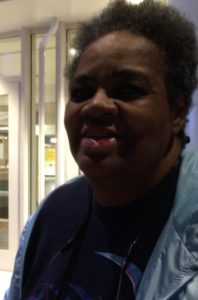 Standing outside the The College of New Jersey (TCNJ) student center one rainy Annual Sessions evening was Inspira Williams, one of Yearly Meeting’s loved and respected Elders.
Standing outside the The College of New Jersey (TCNJ) student center one rainy Annual Sessions evening was Inspira Williams, one of Yearly Meeting’s loved and respected Elders.
Though she’s come to sessions off and on for years, Inspira feels that as a PYM elder she has an important role to play each time our community gathers, and it’s a role that requires her to be “present, so I come as often as I can.”
“It’s worked real well last year, and this year, since (Annual Sessions) has been in New Jersey, because it’s so close to my home.” Proximity aside, Inspira comes because she feels the Quaker community matters. “I think the work we have to do is important, even if it’s tiring.”
Generous with her time, and grounded in Faith, Inspira’s example of giving back inspires us all.
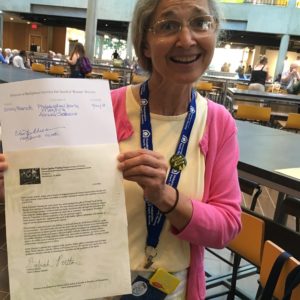 Sandy Boone Murphy came to Sessions to network with Friends and raise up an issue she’s felt connected to for years – the struggle for the Lenape native peoples to legitimize their status as a tribe in New Jersey.
Sandy Boone Murphy came to Sessions to network with Friends and raise up an issue she’s felt connected to for years – the struggle for the Lenape native peoples to legitimize their status as a tribe in New Jersey.
Her work with the Lenape was recognized in a minute adopted by Salem Quarter and read at Annual Sessions this July. The recognition was wonderful, but the primary passion that drives Sandy is Salem Quarter’s work to ensure the tribe is recognized. Recognition will grant access to benefits the state has previously denied.
She explains; “the Nanicote Lenape in South Jersey are seeking affirmation by the state, and our Salem quarter has a minute supporting them in this work as well as a letter in their legal portfolio that we have signed.”
Sandy explains, “we are still wading through that legal process and hope that they do get (their status) established as soon as possible, so that they aren’t denied educational scholarships, small business minority loans, health initiatives for minorities, and coverage for certain conditions like diabetes. And (they’d also benefit from the) economic value in selling their arts if they could label them as ‘Native American.’
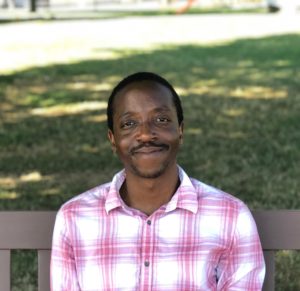 Don Bell, who is not a Friend, visited Annual Sessions to offer a Friends in Fellowship workshop on the congressional Black Talent Initiative in Washington, DC.
Don Bell, who is not a Friend, visited Annual Sessions to offer a Friends in Fellowship workshop on the congressional Black Talent Initiative in Washington, DC.
Funded by a Washington think tank (the Joint Center for Political and Economic Studies) the Black Talent Initiative is led by Don, who serves as its Executive Director. He collaborates with 30 African American organizations and 250 policy and communications experts to ensure African Americans are represented in policy making positions in US Congress.
In addition to giving a workshop, Don sat in on Saturday’s Meeting for Business, attended a listening session afterwards, and shared dinner with members of Green Street, Central Philadelphia and other montly meetings. He reports that time spent as an observer at Annual Sessions generated a “thoughtful and diverse” experience during which he watched Friends address various aspects of civic life. He adds that “these (business) sessions inspired and reflected both the resilience and dedication of the community.”
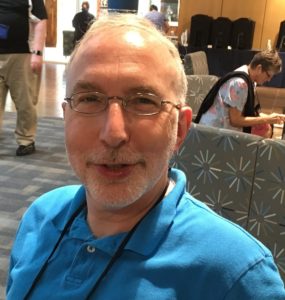 Robert Rosenthal, of Central Philadelphia Monthly Meeting, comes to Sessions for many reasons, but a primary focus is the work he does with the Southwestern Friends Burial Ground committee at Central Philadelphia Monthly Meeting.
Robert Rosenthal, of Central Philadelphia Monthly Meeting, comes to Sessions for many reasons, but a primary focus is the work he does with the Southwestern Friends Burial Ground committee at Central Philadelphia Monthly Meeting.
“We have a beautiful 17-acre burial ground in Upper Darby.” Robert says, and “until a couple of years ago, it was very little used, maybe two or three burials a month—just a handful of Quakers, and a few residents of the neighborhood. It’s always been open to people of all faiths; we have the remains of people from a long time ago.”
However, Robert adds, “in the last few years the Muslim community in West Philadelphia discovered us. Folks from the community came out, met with us, and found they were comfortable with both the physical layout of the burial ground, and the small Quaker-style markers. The markers aren’t considered to be disruptive, so folks from the Muslim communities have started to have burials in our Upper Darby burial ground.”
New initiatives at Southwestern’s acreage include “a new contemplative memorial garden which will provide additional opportunities for people to use the space.’ Robert says, “they might not think of traditional burials for themselves and their families, but the garden will provide opportunities for things like recognition for loved ones, and ways for people to gather and have memorial meetings, for example.”
Robert noticed that respect between the faith communities has been fostered by their shared use of Friends Southwestern Burial Ground. “I think the Muslim community has felt they are respected by the burial ground staff, who do a fantastic job making sure they are appreciated. Overall, we are delighted to have the opportunity to provide ministry to a community that was really in need of a place to mourn their loved ones.”
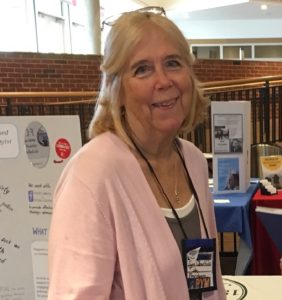 Lynn Oberfield has served our Quaker community as the head of two Friends schools and Clerk of her meeting. She comes to Annual Sessions to support Friends Committee on National Legislation (FCNL) in their lobbying efforts, and also to attend workshops concerned with issues she cares about.
Lynn Oberfield has served our Quaker community as the head of two Friends schools and Clerk of her meeting. She comes to Annual Sessions to support Friends Committee on National Legislation (FCNL) in their lobbying efforts, and also to attend workshops concerned with issues she cares about.
From her perspective as a member of Providence meeting, Lynn says “I’m really looking forward to several workshops, particularly on Middle East issues, and I’m also here to help with a workshop for Friends Committee on National Legislation (FCNL) on lobbying questions to ask (US) political candidates when they are at a forum. I’m also setting up an information table for FCNL and the legislative policy collaborative, and am really looking forward to being located in the (modern and well lit) TCNJ Student center instead of the Black Box theater we had last year!”
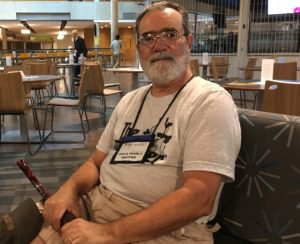 Mike Hainsworth from Seaville meeting says “I’m here because I’m part of the gun violence collaborative and we are trying to get that off the ground. That’s my real emphasis today. At Seaville last summer we did the memorial with the t-shirts and we are talking about that.”
Mike Hainsworth from Seaville meeting says “I’m here because I’m part of the gun violence collaborative and we are trying to get that off the ground. That’s my real emphasis today. At Seaville last summer we did the memorial with the t-shirts and we are talking about that.”
He continues; “we are a small meeting, but with some pretty active members, and we’ve got a lot of different things going on. We have two beach meetings (Sundays throughout summer) in Ocean City and in Cape May. It does draw attendance away from the meetinghouse,” Mike concedes, but adds that beach meetings help accommodate summer visitors, and support Seaville in terms of outreach to new communities.
Mike notes that the meetinghouse may be quiet in summer, but “it’s a good half hour drive from Cape May to Seaville, traffic can be heavy, and people are reluctant to drive the distance” inland for many reasons.
Recognizing turnout would be low anyway, Seaville orchestrated a ‘win-win’ outcome for its community. It’s one that places worship where people most want to be, at the shore—directly on the beach and under the open sky—for everyone’s convenience and love of something different.
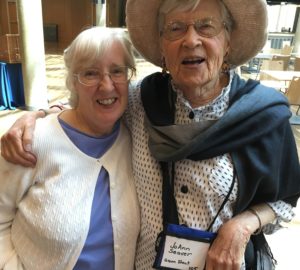 As we packed up at the end of the week to return home, we ran into Sally Gordon (Fallsington Meeting) and JoAnn Seaver (Green Street Meeting). They enjoyed their time at Sessions, and JoAnn shared an interesting metaphor for why PYM and Monthly Meetings needed each other.
As we packed up at the end of the week to return home, we ran into Sally Gordon (Fallsington Meeting) and JoAnn Seaver (Green Street Meeting). They enjoyed their time at Sessions, and JoAnn shared an interesting metaphor for why PYM and Monthly Meetings needed each other.
She compared the relationship between PYM and its constituent Monthly Meetings to that of farmers and the cooperative they distribute their products through.
She said “It occurred to me when I was thinking about it…it’s like a cheese cooperative. The cheese gets made in the monthly meetings, and (PYM is like the) cooperative that helps the monthly meeting get the word out, gets things to scale, keep costs down for the meeting,” and takes on tasks that are tough for meetings to do in isolation.
Yearly Meeting needs to “pay attention to the cheese makers,’ Joann said, “because that’s where the cheese is made, and the cheese makers need to offer products that to sell!”